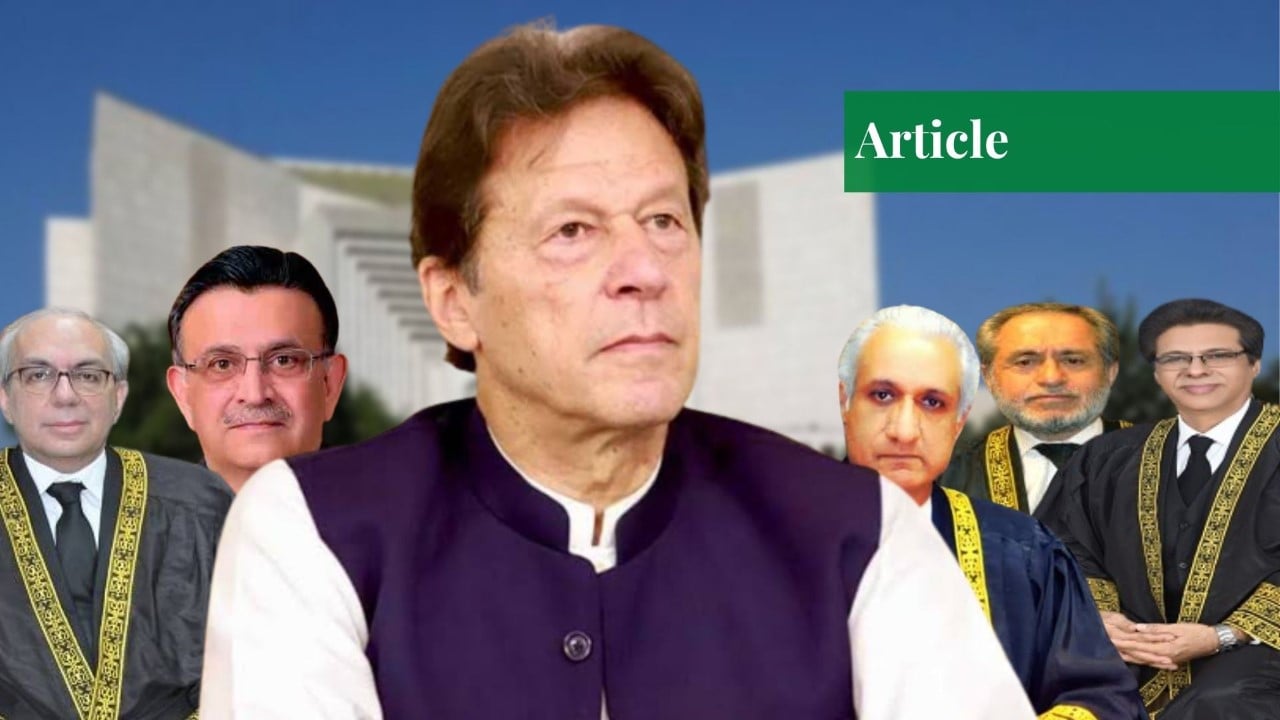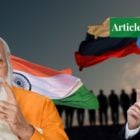Introduction
On April 7th, 2022, the Supreme Court gave a verdict that bifurcated an already-divided nation with pro-PTI citizens calling interference and foul, and pro-PDM citizens celebrating the death of the “law of necessity”. Certain articles of the Constitution were dominating the airwaves at the Supreme Court (including Article 5, Article 6, Article 58(1), and Article 69), with the PTI government of Imran Khan relying on articles that were in their favor to plead their case, while the converse camp was focusing only on those articles that could help their cause.
The decision was uncanny, to say the least, as there was no mention of the threatening letter, the very basis of the case, that pointed to a foreign conspiracy being behind the opposition’s vote of no-confidence. Last night, Pakistan witnessed the ouster of Imran Khan with the Supreme Court being opened at midnight to ensure its orders of holding the vote would not be ignored by the government.
The Dominating Articles and the Verdict
Let us briefly examine some of the articles that were widely discussed during this case:
- Article 5(1) states that every citizen must be loyal to the state. The speaker essentially employed this article when he threw out the no-confidence vote.
- Article 5(2) states that “Obedience to the Constitution and law is the [inviolable] obligation of every citizen wherever he may be and of every other person for the time being within Pakistan.”
- Article 69, which has been interpreted differently in different times states in clause 1: “The validity of any proceedings in [Majlis-e-Shoora (Parliament)] shall not be called in question on the ground of any irregularity of procedure”. Clause 2 asserts that “No officer or member of [Majlis-e-Shoora (Parliament)] in whom powers are vested by or under the Constitution for regulating procedure or the conduct of business, or for maintaining order in [Majlis-e-Shoora (Parliament)], shall be subject to the jurisdiction of any court in respect of the exercise by him of those powers.”
Article 69 has been a controversial article, with the government saying that the National Assembly’s dealings are outside of the court’s jurisdiction and that any member of the National Assembly (NA) executing their Constitutional powers has impunity from any court. According to Barrister Iftikhar Ahmed (former PPP member), Article 69 protects parliamentary proceedings from being challenged in court.
However, Salman Akram Raja, a Supreme Court lawyer, says that exceptions and precedents have been set by the Supreme Court in the past where it intervened and set aside the ruling of the speaker. Others like Salahuddin Ahmed, a constitutional expert, mirrored similar sentiments, citing that “Normally, the speaker’s rulings are granted immunity from judicial scrutiny, but in case – where it’s beyond the jurisdiction of the speaker – the courts can intervene.”
The Supreme Court deliberated on the extent of the constitutional protection of the speaker under Article 69. The court declared it illegal for the speaker to have passed a ruling that the no-confidence would not take place under Article 5 – after which the President, on the advice of the PM, dissolved the assemblies.
What, then, of the dissolution of the Parliament? Well, the Supreme Court cited Article 58(1), which states that the NA cannot be dissolved when a “notice of a resolution for a vote of no-confidence has been given” in the NA. Therefore, the Supreme Court asserted that since former PM Imran Khan was restricted due to Article 58(1), the NA remains undissolved.
Essentially everything went back to how it was. To avoid any other issues, the Supreme Court appallingly listed how the NA should be run on April 9th, 2022 to ensure that the vote of no-confidence takes place – this caused more controversy. While we agree that there needs to be some sort of check and balance in the NA where the Supreme Court can intervene when necessary, we disagree with how much the court inserted itself into the nitty-gritty of the NA’s affairs – and even more importantly how the court blatantly ignored the letter.
Like us, there are many commentators such as Dr. Moeed Pirzada, Barrister Iftikhar Ahmed, Kashif Abbasi, and others that saw the court overstepping in the Parliament’s affairs. The Supreme Court micromanaged the agenda items for the 9th of April so much that it ridiculed the sovereignty of the NA, and it felt as if a parent was scolding the child on how to behave.
PTI’s Shireen Mazari called it a judicial coup. This can set a dangerous precedent for future sessions of the NA. Barrister Iftikhar Ahmed reiterated that the Supreme Court is not above the parliament and is present to interpret the Constitution and therefore should not have dictated orders to the NA on how to act.
The Case of the Letter and Horse Trading
Although many disagreed with Khan’s strategy of doing away with the no-confidence vote, there is a far greater number who were disheartened by the Supreme Court overlooking the letter. The question people are still asking is why was the letter that proved foreign collusion so openly dismissed by the SC?
This letter had the backing of the National Security Committee (NSC) – which included the PM, services chiefs, DG ISI, as well as cabinet members. The NSC found “blatant interference in the internal affairs of Pakistan by the country in question”. The premier wanted to have an in-camera parliament session where the MNAs could be taken into confidence, however, the opposition decided not to show up, according to Asad Umar, and avoided such a session.
The premier was also adamant that the Supreme Court should be made aware of the foreign machinations. The letter revolved around the conversation that Pakistan’s then-ambassador to the US had with Donald Lu, Assistant Secretary of State for South and Central Asian Affairs. Donald Lu allegedly threatened Pakistan and mentioned that if the no-confidence vote against Imran Khan fails, then there would be consequences. It is possible that the new Pakistan-Russia-China bloc that seems to be emerging was the real reason behind Lu’s threat.
This threat was made on March 7th, while the opposition filed for a no-confidence motion on March 8th – too big of a coincidence, no? What of the horse-trading that took place in Islamabad’s Sindh House and then at Marriott several weeks back where the PDM allegedly bribed sitting PTI-MNAs via money and seats in the next election. This was done so that the opposition could gain the 172 members it needed to succeed in unseating Imran Khan.
Should that not have been considered when making a decision? The President of Pakistan even forwarded a reference to the Supreme Court to review Article 63(A) several weeks before (much earlier than this case) which the government hoped would lead to the permanent disqualification of dissenting PTI-MNAs if they voted against party lines in the no-confidence vote.
Explaining Article 63(A), lawyer Salaar Khan stated, “If you’re a member of a political party and elected to the house then if that political party issues directions with regards to our purposes for a vote of no-confidence against the prime minister. If you either vote contrary to those directions or abstain from voting contrary to those directions then you render yourself liable to disqualification under Article 63(A)”.
Imran Khan expressed his dismay at the lack of expeditiousness of the apex court in this regard juxtaposed to the quick ruling the court gave vis-à-vis the deputy speaker’s ruling – not to mention that the court began deliberating on the speaker’s ruling on a Sunday (a holiday). Our grievance, akin to Mr. Khan’s, is that this decision hardly mulled on the letter and the subsequent horse-trading – the basis of the deputy speaker’s ruling.
Separation of Powers
Would it not have been more apt for the Supreme Court to be cognizant of the overall current political situation of the country (foreign conspiracy, horse-trading etcetera) when making a decision? Was it wise to keep the deputy speaker’s ruling isolated from the existing political environment? – especially when the court overstepped its bounds in ordering the NA on how to run its affairs.
Does this not go against the trichotomy of the state i.e. the division of powers between the legislature, the executive, and the judiciary? This is why the people of Pakistan, who are so impassioned right now, are calling out the Supreme Court, the Armed Forces, the West, and anyone in between. On Twitter and social media, the average Pakistani is berating the honorable judges, army’s top brass, PDM officials, and American diplomats constantly as they discern the decision to be ‘influenced and prejudiced’.
On Twitter in Pakistan, the trending tweets right now include #Imported_Government_Unacceptable (in Urdu) with over 2.5 million tweets, #ImranKhan with 328,000, #America’s_Judges_Have_Won (in Urdu) with 118,000, and #Bajwa with around 50,000 to name only a select few. There is a massive perception in the national consciousness of the nation that the establishment, the courts, and the PDM are working in connivance with the US to remove Imran Khan and this kind of thinking is extremely detrimental to our esteemed institutions.
Regardless of the truthfulness or disingenuity of such thinking, one cannot simply ignore it. The Supreme Court could have healed the nation with a decision that took into account the letter and could have helped determine if Pakistan was tumbling yet again into the pitfalls of a foreign Machiavellian ploy. While many are rejoicing the decision as a victory for the Constitution, we ask, is it constitutional to ignore a foreign conspiracy that has enabled horse-trading and smeared Pakistan’s politics?
For the people and legal experts that might claim that the Supreme Court did not want to intervene in foreign policy matters as that would be overstepping, we ask, did the apex court not overstep when it micromanaged how the affairs of 9th April would be conducted? Many might argue that it overstepped by even declaring the deputy speaker’s ruling unconstitutional (in their interpretation of Article 69).
We hope that we do not sound pedantic, but if the decision had shed some light on the merits of the letter, it would have been far more beneficial. This further schism in the nation could have been ameliorated if the Supreme Court had stated that an inquiry or commission be formed to understand how legitimate the letter/threat was. Where it micromanaged and overstepped so much, it could have at least stated that Khan’s previous wish to have an in-camera session of the parliament should be made a reality.
Conclusion
Imran Khan, yet again displaying his indefatigability, decided to file a review petition against the Supreme Court’s verdict. However, Imran Khan was ousted late last night by a vote of no-confidence and this unfortunately means that no PM has ever completed a 5 year term in the country.
The delaying tactics of the government were not amusing to the Supreme Court, who opened their doors at the eleventh hour, again very uncanny, to possibly label contempt of court on the former PM and his aides.
This also raised many eyebrows. The court’s expedited response to everything against Imran Khan whether opening its doors on a Sunday or opening them at midnight has become the source of a plethora of memes on the internet.
I, Sarmad Ishfaq, stand by what I stated in an earlier article – even though Imran Khan has been ousted, he will come out of this on top. The general perception is that he is a lone wolf who was removed by internal and external antagonists, is the only person fighting for Pakistan’s sovereignty, and the only one who can get rid of the PDM’s ‘beggars can’t be choosers mentality’.
If the next elections are free and fair, Imran Khan (despite his shortcomings) has the one thing he needs to succeed – the people’s support.
If you want to submit your articles, research papers, and book reviews, please check the Submissions page.
The views and opinions expressed in this article/paper are the author’s own and do not necessarily reflect the editorial position of Paradigm Shift.




















